This article is part of TPM Cafe, TPM’s home for opinion and news analysis.
Late last month, Donald Trump declared that if he loses the November election, it will be the Jews’ fault. He wasn’t speaking to the Proud Boys or a neo-Nazi group. He was at meetings with Jewish Republicans. Despite this, he made Jews the scapegoat — in advance! — for his possible defeat.
“In my opinion,” Trump said, “the Jewish people would have a lot to do with a loss if I’m at 40 percent” — referring to the number of Jews that he expects to vote for him if nothing changes.
If Kamala Harris wins, Trump warned, Israel will be “eradicated,” “wiped off the face of the earth” and “cease to exist.”
Trump made these remarks at two events on the same day. One, which ironically focused on combatting anti-Semitism, was organized by GOP mega-donor Miriam Adelson. The other was the Israeli-American Council National Summit.
In reality, it would be a historical anomaly if even 40 percent of Jews supported Trump. Since 1960, Jewish Americans’ vote for Republican candidates for president has typically been around 25 percent, from a low of 10 percent for Barry Goldwater in 1964 to a high of 39 percent for Ronald Reagan in 1980. That year Jimmy Carter, running for re-election, got only 45 percent of the Jewish vote, while Independent John Anderson (an Illinois Congressman) received 15 percent. What limited polling there is suggests the pattern will hold true in 2024.
Trump’s recent tirade blaming Jews, specifically, for a future election loss should not be surprising to anyone who knows about his background and has followed his business and political career. Trump has trafficked in anti-Semitic tropes throughout his life, just as he has trafficked in racism, xenophobia, and a kind of genetic determinism that harkens back to the worst moments of twentieth century history. He has described Jews in ways that sound both suspicious of them and begrudgingly impressed by them. He praises Jews as good with money and good at deal-making. In return, he treats them transactionally, as the other party in a negotiation.
He expects Jews to support him because he’s a strong supporter of Israel’s right-wing government, seemingly not recognizing that most American Jews don’t support Prime Minister Benjamin Netanyahu and vote based on a mixture of priorities, including abortion, gun laws, the rise of Christian nationalism (and Trump’s support for it), and the imperiled state of our democracy.
Smarting at this rejection, Trump issues his ominous warnings — “I did more for the Jewish people than anybody, and it’s not reciprocal,” he complained on the anniversary of October 7. He has grumbled that Jews “are only in it for themselves” and “stick together,” aides told the Washington Post. He takes umbrage at being called an anti-Semite. “I’m the least anti-Semitic person you’ve ever seen,” he’s said on several occasions. But he has consistently alluded to dark stereotypes of Jews as all powerful, nefarious figures. He has emboldened hate groups with his words and actions.
Even if he loses the election, those groups won’t simply retreat to the shadows. And if he wins, many Jews fear, he will likely unleash an upsurge of hate, including anti-Semitism, of the sort America hasn’t seen in almost a century.
As the 2024 election approaches, with Trump leaning heavily into his appeals, and warnings, to Jewish voters, it is worth reexamining the toxic mix of anti-Semitism, racism, and conspiracy theorizing that his long career in public life has churned up, and that may once again sweep into the White House next year.
The Jews of Trump-World
Trump’s ideas about Jews seem to stem from long before his time in politics, during his rise in New York real-estate. “A lot of you are in the real-estate business, because I know you very well,” he told the Israeli-American council in 2019. “You’re brutal killers. Not nice people at all.”
In his 1991 book, “Trumped!” John O’Donnell, former president of the Trump Plaza Hotel & Casino, recounted Trump’s anger when he learned that O’Donnell had hired Black employees in the casino’s finance department. “Black guys counting my money! I hate it,” Trump told him. “The only kind of people I want counting my money are short guys that wear yarmulkes every day.” (Trump has at times disputed O’Donnell’s account.)
In 1971, Trump became president of his father’s real-estate empire, which was dogged by allegations of profiteering and racism toward Black families, and renamed it The Trump Organization. The younger Trump wanted to move out of New York’s outer boroughs and become a big-time developer in Manhattan. To do so, he had to compete with the Jewish-run firms that dominated New York’s real estate industry.
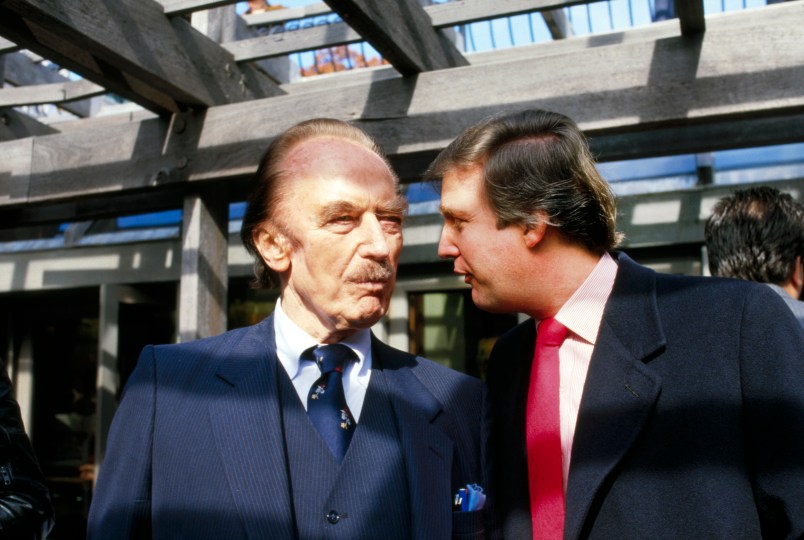
It was during this time that Jews came to play an important role in Trump-world: the consigliere. Since most of Trump’s personal, political, and business relationships were and are transactional, it should not be surprising that in Trump-world, Jews are not friends or even business partners: they are advisors.
First among them was Roy Cohn, the former lawyer for Joe McCarthy who met Trump in the early 1970s. He initially helped Trump settle a discrimination lawsuit from the Department of Justice, which found that he had banned Black tenants from his apartment buildings. Cohn quickly became his advisor and fixer, teaching him how to navigate among politicians, the Mafia, construction unions, the media, and the courts to expand his real estate empire into Manhattan and embolden the Trump brand. Trump learned a core Cohn lesson: never admit you’re wrong, and never apologize.
Next came Allen Weisselberg, who worked as an accountant for Trump’s father and eventually became the chief financial officer of the Trump Organization, hired to keep Trump’s secrets about his business deals and his tax returns.
Michael Cohen served as Trump’s personal lawyer beginning in 2006, eventually becoming vice president of the Trump Organization, but he was essentially Trump’s final fixer before entering the realm of politics. It was Cohen who arranged the payments to porn star Stormy Daniels to keep her quiet about her relationship with Trump. Trump installed Cohen as deputy finance chairman of the Republican National Committee during the first two years of his presidency.
In the end, Trump’s relationship with all three men broke apart. Cohen would later testify that he tried to remain loyal to Trump, even as the FBI raided his home and office in connection with the hush money deal he had orchestrated on Trump’s behalf, but felt his loyalty was unreciprocated. He flipped on Trump after a family intervention. Until it was no longer possible Weisselberg continued to protect Trump, but in 2022 took a plea deal, pleaded guilty to 15 criminal charges including grand larceny, criminal tax fraud and falsifying business records on Trump’s behalf, and served a five month prison sentence. In 2024, he pleaded guilty to perjury and was sentenced to another five months behind bars, as well as being permanently banned from serving in a financial position in any New York corporation or business. Even after Cohn was disbarred, he continued to work for Trump until it became public that the closeted Cohn had AIDS, at which point Trump refused to speak with him again. Cohn died in 1986, but Trump waxed nostalgic for his one-time fixer. When Trump’s first Attorney General Jeff Sessions recused himself from the Russia investigation, Trump complained, “Where’s My Roy Cohn?”

During a campaign speech before the Republican Jewish Coalition in December 2015, Trump told his audience, “I’m a negotiator like you folks, we are negotiators … Is there anybody that doesn’t renegotiate deals in this room?”
When it came time for the president-elect to select his Cabinet, Trump appointed two Jews, both bankers, to oversee economic affairs: Gary Cohn as head of the National Economic Council, and Steve Mnuchin as his chief fundraiser and then his Treasury Secretary. The other two high-level Jews in the Trump administration were son-in-law Jared Kushner and right-wing ideologue Stephen Miller, the main architect of Trump’s attacks on immigrants.
Trump and Genetic Determinism
There’s a more expansive rhetoric of racial and ethnic difference that looms behind Trump’s testament that Jews are good with money: it’s an articulation of a kind of scientific racism that has popped up periodically in Trump’s long career — most recently on Monday, when the former president baselessly told radio host Hugh Hewitt that many thousands of “murderers” had been let into the country during the Biden administration.
“Now a murderer — I believe this — it’s in their genes,” he said of recent immigrants to America. “And we got a lot of bad genes in our country.”
Long before he ran for president, Trump made statements like this that smack of race science, the discredited, fake discipline that was popular in the early 1900s and that viewed some groups as genetically superior and others inferior. It lives on in Trump’s periodic assertion that he believes in a kind of genetic determinism.
In 1988, he told Oprah Winfrey that a person had “to have the right genes” in order to achieve great fortune. In 2010, he told CNN that he was a “gene believer,” explaining that “when you connect two racehorses, you usually end up with a fast horse.” He compared his own “gene pool” to that of successful thoroughbreds.
During his career in politics, Trump’s genetic theorizing has taken a darker turn. In a 2020 campaign speech to a crowd of white supporters in Minnesota, Trump said, “You have good genes, you know that, right? You have good genes. A lot of it is about the genes, isn’t it, don’t you believe? You have good genes in Minnesota.”
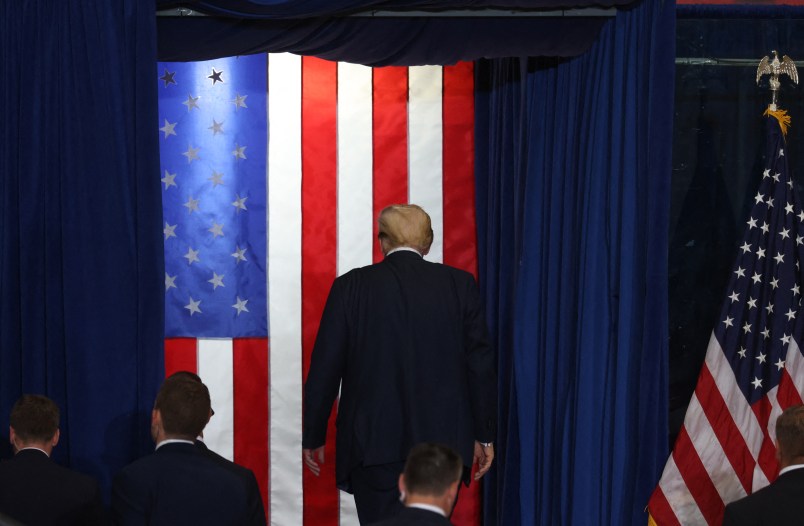
Trump said at a rally last December in Iowa that immigrants are “poisoning the blood of the country.” Similarly, in 2018 he referred to Haiti and African nations as “shithole countries” and said he preferred immigrants from places like Norway, whose population is almost entirely white. During a speech in Michigan this April, Trump called undocumented immigrants “animals” and “not human.”
The same ideas — genetic determinism, specifically with regard to immigration — were en vogue in the first half of the 20th century. They formed the basis of eugenics, which was popular in the U.S. and used to justify restrictions on immigration and involuntary sterilization of the “unfit.” Nazi doctors were influenced by American eugenics thinking in their quest to develop a superior Aryan race.
Many eugenicists believed that Jews were not really white. Rather, Jews were categorized as a separate race who, along with other immigrant groups and African Americans, could not assimilate into white American culture and society. Those ideas gained traction as Jews became convenient scapegoats. During this period, Jews often faced physical violence in the U.S., including the lynching of Leo Frank outside Atlanta in 1915, and the attacks on Jews by American Nazis and other street thugs during the 1930s and 1940s. They faced discrimination in jobs and housing. Colleges imposed quotas on Jewish students. Many hotels, resorts, and clubs barred Jews. The Ku Klux Klan surged, organizing itself as a nativist, fraternal organization that targeted Jewish and Catholic immigrants as well as African Americans. Fred Trump, Donald Trump’s father, was arrested at an anti-Catholic KKK march in Queens in 1927.
A 1938 poll found that about 60 percent of Americans held a low opinion of Jews, labeling them “greedy,” “dishonest,” and “pushy.” In 1939, a Roper poll found that 53 percent believed that “Jews are different” from other Americans. Ten percent favored their deportation. A 1945 survey found that 23 percent of Americans would vote for a congressional candidate who declared himself as “being against the Jews.”
The most overt forms of anti-Semitism began to wane after the Second World War, but they didn’t disappear. The KKK and other segregationists bombed Southern synagogues and the homes of outspoken Jews in response to Jews’ support for the civil rights movement in the 1950s and 1960s. The “No Dogs, No Coloreds, No Jews” sign at the Baltimore Country Club in Maryland didn’t come down until 1970.
Now it is making a comeback, thanks, in part, to Trump.
Anti-Semitic Conspiracy Theories and the Current Political Moment
When Trump descended his escalator, he met his moment, running for president in an America increasingly rife with conspiracy theories. It’s here that America’s latent anti-Semitism, Trump’s anti-Semitic rhetoric, and his appeals to xenophobia and race science overlap. When neo-Nazis at Charlottesville chant “Jews will not replace us,” they are referencing a kaleidoscopic set of conspiracy theories that hold — baselessly, ridiculously — that Jews are behind the greatest betrayal in American right-wing mythology: an imagined plot to ensure that supposedly pliable, non-white immigrants replace white, Christian, American men.
Trump, in his unending fight to hold onto political power, stokes America’s conspiratorial flame. Like many of his followers, Trump often describes a world that is dark and foreboding, manipulated by conspiracies of invisible networks in which the elite pull the strings. He hasn’t been shy about inserting anti-Semitic conspiracy theories into campaign ads and talking points.
In July 2016, during his campaign, Trump tweeted a graphic borrowed from 8-chan, a message board frequented by white supremacists, showing Hillary Clinton against a backdrop of $100 bills. Inside a six-pointed red star (clearly the Star of David) were the words, “Most Corrupt Candidate Ever!”
In a speech in October 2016, Trump claimed that “Hillary Clinton meets in secret with international banks to plot the destruction of U.S. sovereignty in order to enrich these global financial powers, her special interest friends and her donors.” He didn’t need to use the word “Jew” in order to evoke the sort of global banking cabal familiar to anyone who is passingly familiar with The Protocols of the Elders of Zion, the anti-Semitic forgery that has fueled anti-Jewish violence for over a century.
In Trump’s final campaign video, a clear appeal to anti-Semitism, he warned of “those who control the levers of power in Washington” and of “global special interests” who “partner with these people who don’t have your good in mind,” while pictures flashed of Hillary Clinton and three Jews: billionaire and philanthropist George Soros, Federal Reserve Chair Janet Yellen, and Goldman Sachs CEO Lloyd Blankfein.
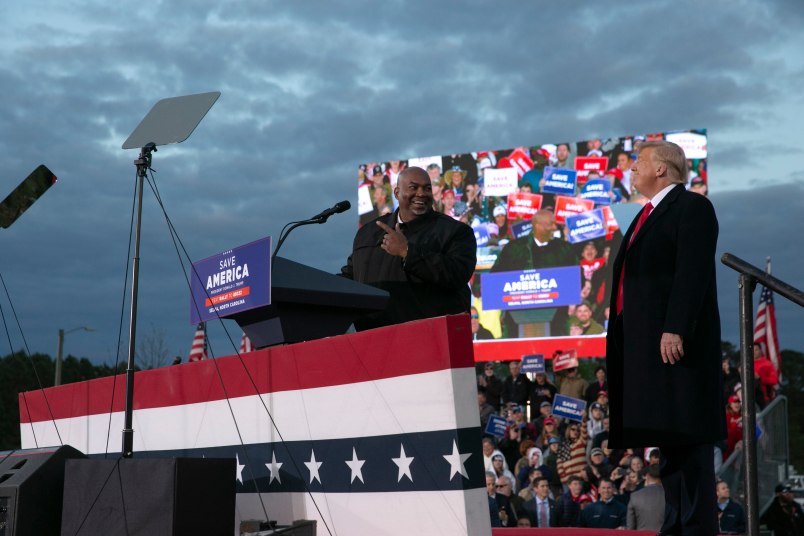
Over time, the subtext has become text. In 2019, Trump had dinner at Mar-a-Lago with Nick Fuentes, perhaps the most influential white nationalist and Holocaust denier in the U.S., and with Kanye West, the rapper who now goes by Ye, who has spewed anti-Semitic rhetoric. Trump has been a strong supporter of other anti-Semites, including Mark Robinson, the North Carolina gubernatorial candidate, who had a history of making anti-Semitic remarks dating back long before Trump endorsed him. He raised money for Robinson and gave him a speaking role at this summer’s Republican convention. It was only after CNN reported that Robinson had described himself as a “Black Nazi” that Trump stopped campaigning with him, but he has yet to criticize Robinson’s repugnant remarks.
Reflecting the lessons taught by Roy Cohn, Trump hasn’t apologized or explained his association with any of these bigots.
The Real Reason Trump Fails To Attract Jewish Support
At the core of Trump’s attempt to appeal to Jews is a kind of quid-pro-quo based on the misguided belief that Jews are single-issue voters. Trump portrays himself to Jews as “your defender, your protector,” and “the best friend Jewish Americans have ever had in the White House.” “I’m the one that’s protecting you,” Trump said in one recent speech to Jewish Republicans, adding that Democrats “are the people that are going to destroy you.” But when Trump tells Jews that he’s their best friend, he means he is a friend to Israel’s political right — not that he aligns with American Jews on the issues they care about.
Trump frequently complains that American Jews have been insufficiently grateful for the instances when he has taken steps applauded by Israel’s government, such as moving the U.S. Embassy from Tel Aviv to Jerusalem and recognizing Israel’s annexation of the Golan Heights. “No President has done more for Israel than I have,” he recently tweeted.
There are a multitude of problems with Trump’s attempt to attract Jewish voters.

First, Trump conflates Jewish and Israeli identity. When he talks to groups of Republican Jews, he refers to Israel as “your country” and Benjamin Netanyahu as “your prime minister.” Implicit in this language is the suggestion that Jews can’t be loyal Americans, because they are so closely tied to Israel.
Second, he doesn’t understand that for most Jewish voters, Israel is not the only priority at the ballot box. They don’t support Trump because they disagree with him on a wide range of policy issues, from gun control (Jews have the lowest rate of gun ownership of all religious groups) to reproductive rights (Jews are widely in favor of expanding access to abortion). According to a 2020 Pew poll, Jews overwhelmingly disapproved of Trump’s handling of a host of flash-point issues, including family separations at the Mexican border (78 percent), treatment of DACA recipients (74 percent), guns (74 percent), Supreme Court nominations (69 percent), and banning immigration from certain Muslim-majority countries (66 percent).
And, so, despite his efforts to cultivate them, American Jews have never embraced Donald Trump.
In his 2016 contest against Hillary Clinton, Trump got 29 percent of the Jewish vote. In 2020, a poll sponsored by the Republican Jewish Coalition found that 30 percent of Jews voted for Trump, while another survey that year by the liberal J Street found that only 21 percent of Jews supported Trump.
Polls suggest a similar split this year: Harris leads Trump among Jewish voters a 72 percent to 25 percent, according to a poll conducted in September on behalf of the Jewish Democratic Council of America.
Trump’s obsession with the Jews is not explained by electoral necessity. Though Jewish voters have historically supported Democratic candidates for president by wide margins, Trump is likely wrong that Jewish voters will play a pivotal role in the outcome of this election. Jews represent a little more than 2 percent of the U.S. population and about 3 percent of all voters. Jews are largely concentrated in a few regions of the country, particularly New York, Florida, and California. Among the swing states, only in Pennsylvania do Jews comprise more than 3 percent of likely voters. If Trump loses the Keystone State by 500, 5,000 or 50,000 votes, there are many groups he can, and may well, blame — women, young people, African Americans, and union members — all of which comprise much larger portions of the Pennsylvania electorate than Jews. The same is true in the other swing states, where Jews comprise between 0.6 percent (Wisconsin) and 2.6 percent (Nevada) of all voters.
Trump’s outrage at the low level of support he gets from Jews spilled over when he blamed Jews for a possible loss while continuing to support positions they oppose.
The 2020 Pew poll discovered that only 27 percent of Jews approved of Trump’s job performance as president. Among subgroups within the Jewish community, 21 percent of non-affiliated Jews, 18 percent of Reform Jews, 29 percent of Conservative Jews, and 81 percent of Orthodox Jews gave Trump a thumbs-up.
Trump’s illegal efforts to undermine American democracy — including trying to overturn the 2020 election and inciting the January 6, 2021 insurrection at the Capital — was, according to polling, particularly galling to American Jews, perhaps because the Trump followers who participated in the January 6 insurrection include members and leaders of hate groups who espouse anti-Semitism and other forms of bigotry, including neo-Nazis and white supremacists.
Asked in the June 2023 poll to identify two issues that are most important to them when deciding how to vote in 2024, 37 percent of Jews listed “the future of democracy” — more than any other issue.
Compounding this is the ascendancy of self-described “Christian nationalists” in Trump’s orbit. Jews are understandably wary of Trump’s support for this section of the American right.
Trump is neither religious nor knowledgeable about theology, but he knows how to tap into white evangelicals’ fears of being persecuted, feeling embattled, losing their cultural identity to unwelcome immigrants, and blaming Jews for their predicament.
“Our country’s gone to hell. As soon as I get back in the Oval Office, I’ll also immediately end the war on Christians. I don’t know if you feel it. You have a war. There’s a war,” said Trump in a speech in Iowa in December. “Under crooked Joe Biden, Christians and Americans of faith are being persecuted and government has been weaponized against religion like never before.”
Who could possibly be behind an alleged “war on Christians”?
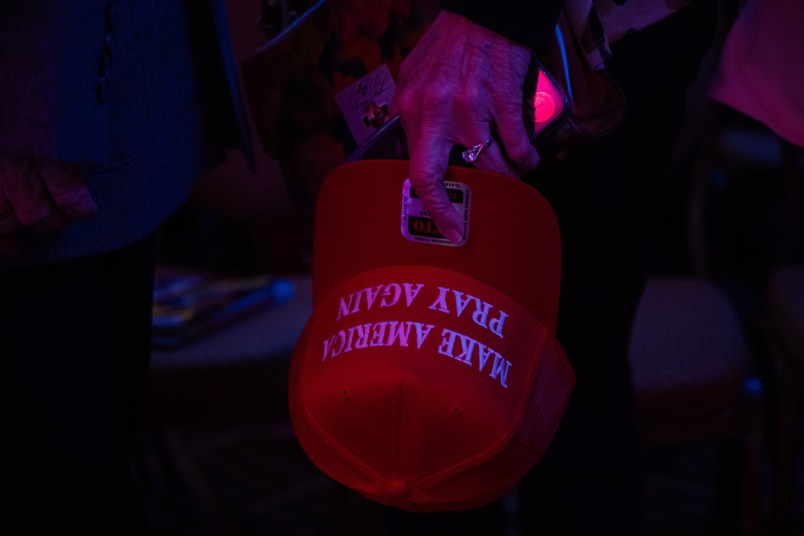
In both the 2016 and 2020 elections, about 80 percent of white Christian evangelicals voted for Trump, accounting for 45 percent of his total vote both times.
A 2021 PRRI survey found that 81 percent of white evangelicals believe that the country’s founders intended for America to be a “Christian nation” and that it should be one today. Three-quarters (76 percent) say that being Christian is important to being “truly American.”
The same goes for ethnic diversity. Sixty-one percent of white evangelicals believe that “immigrants are invading our country and replacing our cultural and ethnic background.” Three-quarters (74 percent) of white evangelicals support installing deterrents, such as walls, floating barriers in rivers, and razor wire to prevent immigrants from entering the country illegally, even if such measures endanger or kill some people.
The Consequences of Trump’s Anti-Semitism
“As anti-Semitism has surged from the internet into the streets, President Trump has done too little to rouse the national conscience against it,” the New York Times observed in an April 2019 editorial.
That’s putting it mildly. Since he started running for president in 2015, Trump has emboldened Jew-haters with his appeals to racism, white supremacy, and anti-Semitic conspiracy theories. He verbalizes, encourages, enables, tolerates, winks at, and makes excuses for anti-Semitism, most notably when he said that some of the torch-wielding Nazis marching in Charlottesville in 2017 were “good people.”
It is no accident that anti-Semitic social media posts and incidents have spiked since Donald Trump took the political stage.
The shooters who in recent years have gone on rampages against Jews echoed the anti-Semitic canard about Jews plotting to promote non-white immigration.
Before he entered Pittsburgh’s Tree of Life synagogue in 2018 and killed 11 Jews at worship, Robert Gregory Bowers posted a message online attacking HIAS (originally called the Hebrew Immigrant Aid Society), a Jewish nonprofit group that was helping bring refugees from Syria and Afghanistan to the United States. “HIAS likes to bring invaders in that kill our people,” he wrote. “I can’t sit by and watch my people get slaughtered.”
In 2019, John Earnest fired shots into a synagogue in Poway, near San Diego, killing one woman and injuring three others, including the synagogue’s rabbi. He had earlier written “I would die a thousand times over to prevent the doomed fate that the Jews have planned for my race” on an anti-Semitic message board. “Every Jew is responsible for the meticulously planned genocide of the European race. They act as a unit, and every Jew plays his part to enslave the other races around him — whether consciously or subconsciously. Their crimes are endless.”
Robert Crimo — who killed seven people and injured more than 30 people with a semi-automatic rifle during a July 4, 2022 parade in Highland Park, a heavily Jewish suburb of Chicago — had posted anti-Jewish and racist material online, as well as a photo on Twitter showing him draped in a Trump flag.
American Jews make up 2.4 percent of the U.S. population, but in 2023 they were the targets of the majority of all religion-based hate crimes in the country.
Throughout history, Jews have generally opposed dictators and autocrats, in large part because they have tended to persecute Jews. Trump, in contrast, admires strong men who rule outside the constraints of democracy and the rule of law, including Vladimir Putin and Viktor Orbán. He has even, per a former White House chief of staff, expressed admiration for Adolf Hitler.
Most American Jews understandably fear that if Trump is elected this year, his disdain for democracy and the rule of law, and his alliance with hate groups, including anti-Semites, will unleash new horrors.
Even if Trump loses the election, the rise of organized hate will persist, and Trump could continue to be its highest-profile cheerleader. Trump has inspired and emboldened a racist and anti-Semitic infrastructure that won’t likely retreat into the relative obscurity it inhabited before Trump became president.


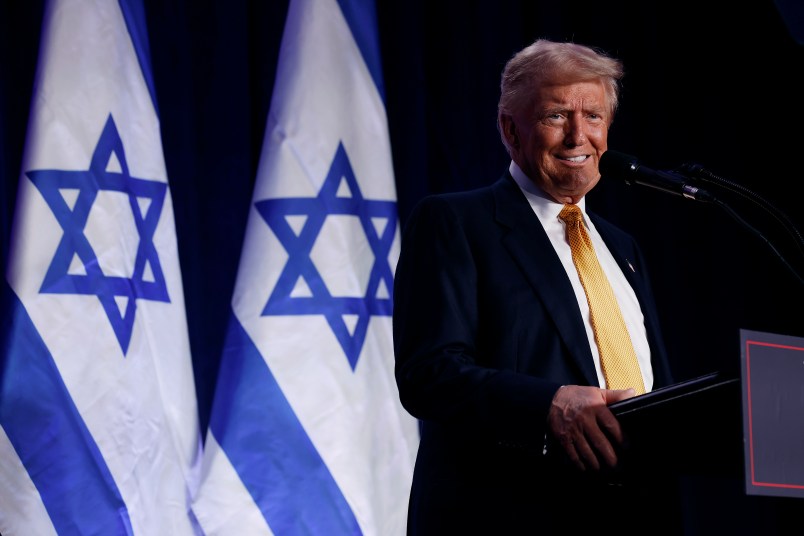




No surprises here. The guy is a general bigot.
On day closer to 11/5 and hopefully the end of tsf as a presidential candidate (and, heaven forbid, as a president).
… that incites other bigots
And that’s a feature, not as bug.